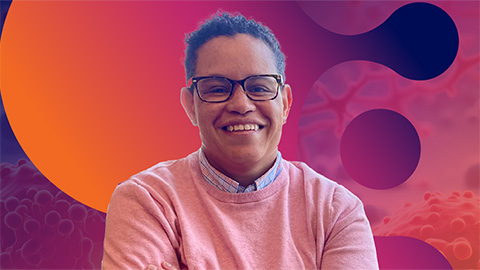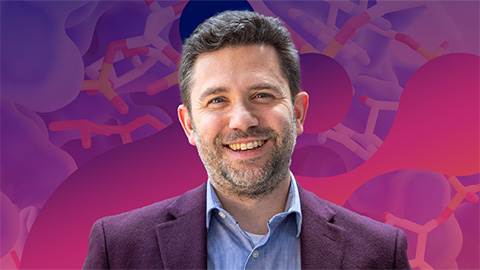New drug shows promise against Toxoplasmosis
Findings from a new University of Kentucky College of Medicine study published in the Journal of Biological Chemistry May 28 may lead to a new treatment against Toxoplasma gondii, the parasite that causes toxoplasmosis.
The Centers for Disease Control and Prevention reports that an estimated 40 million people in the U.S. carry the parasite T. gondii, but very few have symptoms because the immune system usually keeps the parasite from causing illness. However, toxoplasmosis can have severe consequences for women newly infected during pregnancy and anyone with a compromised immune system.
Those who have severe toxoplasmosis can harbor a cyst version of the parasite within brain and muscle tissue. These cysts are responsible for causing serious disease, especially in people who are immunocompromised.
The labs of Matthew Gentry, Ph.D., and Craig Vander Kooi, Ph.D., in the Department of Molecular and Cellular Biochemistry, Anthony Sinai, Ph.D., in the Department of Microbiology, Immunology and Molecular Genetics, and Zhong-Yin Zhang, Ph.D., at the Purdue Institute for Drug Discovery, collaborated to develop a drug that targets the cyst form of the parasite.
In previous research, Gentry identified an enzyme in T. gondii called TgLaforin, which he hypothesized was critical in allowing the parasite to access energy from a carbohydrate storage molecule. The team developed a new drug that inhibits TgLaforin with the goal of preventing enzymes from accessing and providing energy to the parasite.
While there are FDA-approved drugs to treat the symptoms of toxoplasmosis, no current therapeutics target the cyst form of the parasite.
The new discovery was made possible thanks to the multidisciplinary collaboration of experts from the four labs, says Gentry.

Robert Murphy, Ph.D., a member of the Gentry and Sinai labs, conducted initial experiments that characterized TgLaforin and provided a baseline for understanding the enzyme’s function.
Tiantian Chen, a graduate student in Vander Kooi’s lab, generated models of TgLaforin using a new program called AlphaFold2, which is an artificial intelligence algorithm that provides valuable insights into research. Chen generated models that provided a picture of the enzyme that demonstrated TgLaforin was a unique and possible drug target.
Jianping Lin, Ph.D., a postdoc in Zhang’s lab, then used information generated by Murphy and Chen in combination with novel techniques in chemistry to generate the first version of a future anti-Toxoplasma drug.
“I was excited to find that the drug was effective against TgLaforin in test tubes and that it prevented TgLaforin from performing its normal activity against a variety of substrates, including carbohydrates,” said Murphy.
Future work from these labs will test the drug on parasites. The team will then seek to increase its potency and selectivity and adapt its chemical properties to allow for animal studies.
“This study is a great example of what Provost DiPaola consistently promotes regarding transdisciplinary research,” Gentry said. “This work was a true team effort and it is very exciting to see where we take it next.”
This article originally appeared on the University of Kentucky website. It was republished with permission. Robert Murphy contributed to the report.
Enjoy reading ASBMB Today?
Become a member to receive the print edition four times a year and the digital edition monthly.
Learn moreGet the latest from ASBMB Today
Enter your email address, and we’ll send you a weekly email with recent articles, interviews and more.
Latest in Science
Science highlights or most popular articles

Redefining lipid biology from droplets to ferroptosis
James Olzmann will receive the ASBMB Avanti Award in Lipids at the ASBMB Annual Meeting, March 7–10, just outside of Washington, D.C.

Women’s health cannot leave rare diseases behind
A physician living with lymphangioleiomyomatosis and a basic scientist explain why patient-driven, trial-ready research is essential to turning momentum into meaningful progress.

Life in four dimensions: When biology outpaces the brain
Nobel laureate Eric Betzig will discuss his research on information transfer in biology from proteins to organisms at the 2026 ASBMB Annual Meeting.

Fasting, fat and the molecular switches that keep us alive
Nutritional biochemist and JLR AE Sander Kersten has spent decades uncovering how the body adapts to fasting. His discoveries on lipid metabolism and gene regulation reveal how our ancient survival mechanisms may hold keys to modern metabolic health.

Redefining excellence to drive equity and innovation
Donita Brady will receive the ASBMB Ruth Kirschstein Award for Maximizing Access in Science at the ASBMB Annual Meeting, March 7–10, just outside of Washington, D.C.

Mining microbes for rare earth solutions
Joseph Cotruvo, Jr., will receive the ASBMB Mildred Cohn Young Investigator Award at the ASBMB Annual Meeting, March 7–10, just outside of Washington, D.C.

